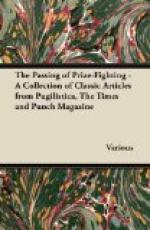The herrings with the nice soft rows
Are gentlemen; the rest are does.
The survivors of the family had now to choose a career. From the beginning it seems to have been recognised that Stephanie at least would have to be content with a humbler sphere than her more gifted brothers. She had a hard roe and was rather looked down upon. But she was an independent little thing and her pride revolted at a life of subjection at home; so while still a girl she went off on her own and got mixed up with some pilchards who were just being caught in a net. Stephanie was caught too and became a sardine. She was carefully oiled and put in a tin, and she was eaten at a picnic near Hampton Court. But there is every reason to suppose that she was eaten happy, since in those less exacting circles nobody seemed to mind about her hard roe, which had been a perpetual bugbear to her in the herring world.
Meanwhile the remaining three had decided on a career. They were determined to be fresh herrings. This is of course the highest ambition of all herrings, though sadly few succeed in attaining it. One herring in his time plays many parts (SHAKESPEARE); he can seldom say with confidence what exactly he will be to-morrow; but he can be fairly certain that it won’t be a fresh herring. Of our three survivors Rupert alone was to win the coveted distinction. He grew to be a fine boy and was eaten at Hammersmith, where his plump but delicate roe gave the greatest satisfaction. It was not eaten in the ordinary humdrum way, but was thickly spread on a piece of buttered toast, generously peppered, and devoured. And when his “wish” was placed on the kitchen-range, swelled rapidly and burst with a loud report, his cup of happiness was full.
Little Foch, alas, failed to fulfil his youthful promise and became a common bloater. Worse than that, he was bloated too thoroughly and was almost impossible to eat. Even his lovely roe, the pride of his heart, became so salt that the Rector of Chitlings finally rejected it with ignominy, though not before he had consumed so much of it that he had to drink the whole of his sermon-water before he began to preach.
But it was Walter, Walter the chronicler, Walter the clever, the daring, the ambitious, leader in every escapade, adviser in every difficulty, who was to suffer the crowning humiliation. Walter became a kipper. If there is one thing that a herring cannot stand it is to be separated from his roe. Walter’s roe was ruthlessly torn from him and served up separate on toast, with nothing to show that it was the glorious roe of Walter. It was eaten at the Criterion by a stockbroker, and it might have been anybody’s roe. Meanwhile the mutilated frame, the empty shell of Walter, was squashed flat in a wooden box with a mass of others and sold at an auction by the pound. It broke his heart.
A.P.H.
* * * * *




